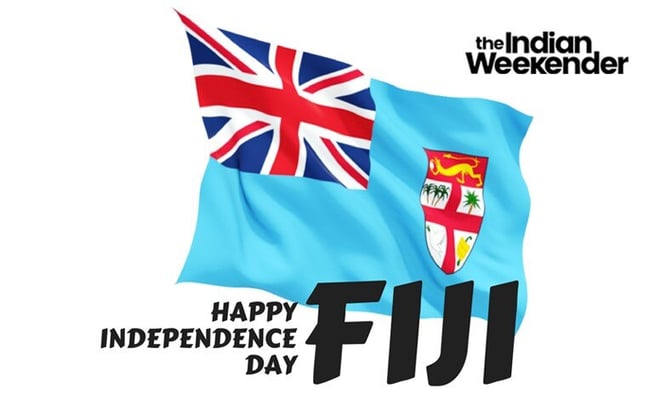Celebrating Fiji’s 50th anniversary of Independence

We congratulate Fiji on reaching a significant milestone, marking 50th Anniversary of its independence. Unlike most other colonized nations, Fiji attained its independence without struggle, bitterness or violence that preceded the granting of independence to most. It was mutually achieved when two political parties, the ruling Alliance Party and the opposition National Federation Party (NFP), agreed to seek Fiji’s independence, which resulted in the formulation of the 1970 Constitution. In a gesture of goodwill, the NFP allowed the Alliance Government to complete its full term, which meant elections in 1972 and not immediately after Fiji’s independence on 10 October 1970. It allowed Fijians to continue to live in the afterglow of independence and adjust to the new political reality that Fiji was now the master of its own destiny and not subject to the remote control from London.
Traditionally, elections in Fiji draw a lot of heat and dust and deferring the election immediately after the election was a prophetic decision. The nation vibrated with unity, amity and goodwill, as both the Prime Minister Ratu Sir Kamisese Mara and Leader of Opposition Siddique Koya worked in unison, which belied what was to follow. Predictably, the short sojourn came to an abrupt end, following the 1972 election when the bitterness and acrimony in race relations resurfaced. The two parties, during the election campaign, relapsed into their racial enclaves, as the Alliance Party, representing indigenous Fijians, claimed that if the NFP formed the government, there was threat of indigenous Fijians losing their landownership rights, including their culture, customs and customary rights. The NFP also ran an equally steamy campaign, blaming the Alliance Party of cronyism, misrule and racial discrimination.
A major focus of the 1970 Constitution was ethnic seats and ethnic voting, which promoted racial segregation, as opposed to racial integration desired by every democracy that upheld its basic values. Sadly, Fiji was abysmally short on this count and predictably, elections in Fiji contributed to racial compartmentalization, which stirred racial feelings. Consequently, the politicians exploited peoples’ feelings and emotions tethered to their racial affiliations. Fiji was caught in the bog of prejudice, racism, and inequality, which meant that it could not continue to walk the treacherous path for too long. The coups of 1987, 2000 and 2006 were manifestations of a restive proletariat that sought change. The 1987 and 2000 coups advocated indigenous Fijian political supremacy while the 2006 coup advocated inter alia common franchise, common identity and equality. Accordingly, those in power formulated the 2013 Constitution, which removed the ethnic seats and ethnic voting, allowing racial integration and national unity.
On its 50th Anniversary, Fiji can proudly claim that there have been numerous setbacks but it always bounced back, guided by broader interests of the nation. Despite turbulent events in its history, Fiji did not descend into violence, leading to bloodshed. However, it has a long way to travel to gain political stability, as those opposed to the current 2013 Constitution, seek to restore ethnic seats, ethnic voting and indigenous Fijian political supremacy. They still comprise a significant political force and predictions are that they could win the next election due in 2022, which would not go down well with Fiji Indians as they could again suffer racial discrimination and marginalization. At Fiji’s independence in 1970, they comprised just over 50 percent of Fiji’s population, which now hovers around 33 percent. According to Dr Wadan Narsey, a respected economist and writer Fiji was going through a ‘population revolution’ and forecast Fiji Indians population to be down to 26 percent by 2027 and indigenous Fijian population to increase to 70 percent. He attributed this to emigration and dramatic fall in Fiji Indians fertility.
Once Fiji was the jewel of the Pacific but following the first military coup, it lost the crown and it is not going to be easy to regain such glory. Rajendra Prasad, author and columnist whose views on Fiji politics is widely respected, said, “Fiji’s foundational 1970 Constitution entrenched politics of ethnicity, which shaped the psyche of the nation, as people remained compartmentalized within their ethnic boundaries and viewed one another from the prism of their racial prejudices. Fiji’s 50 years tryst with democracy was a sordid affair and the next 50 years, hopefully, is better as the rein of political power passes into the hands educated and informed generations who may not like to replicate the ignominy of the past.”
Krish Naidu is a 4th generation Fiji Indian and is the President of Fiji Girmit Foundation NZ.
We congratulate Fiji on reaching a significant milestone, marking 50th Anniversary of its independence. Unlike most other colonized nations, Fiji attained its independence without struggle, bitterness or violence that preceded the granting of independence to most. It was mutually achieved when two...
We congratulate Fiji on reaching a significant milestone, marking 50th Anniversary of its independence. Unlike most other colonized nations, Fiji attained its independence without struggle, bitterness or violence that preceded the granting of independence to most. It was mutually achieved when two political parties, the ruling Alliance Party and the opposition National Federation Party (NFP), agreed to seek Fiji’s independence, which resulted in the formulation of the 1970 Constitution. In a gesture of goodwill, the NFP allowed the Alliance Government to complete its full term, which meant elections in 1972 and not immediately after Fiji’s independence on 10 October 1970. It allowed Fijians to continue to live in the afterglow of independence and adjust to the new political reality that Fiji was now the master of its own destiny and not subject to the remote control from London.
Traditionally, elections in Fiji draw a lot of heat and dust and deferring the election immediately after the election was a prophetic decision. The nation vibrated with unity, amity and goodwill, as both the Prime Minister Ratu Sir Kamisese Mara and Leader of Opposition Siddique Koya worked in unison, which belied what was to follow. Predictably, the short sojourn came to an abrupt end, following the 1972 election when the bitterness and acrimony in race relations resurfaced. The two parties, during the election campaign, relapsed into their racial enclaves, as the Alliance Party, representing indigenous Fijians, claimed that if the NFP formed the government, there was threat of indigenous Fijians losing their landownership rights, including their culture, customs and customary rights. The NFP also ran an equally steamy campaign, blaming the Alliance Party of cronyism, misrule and racial discrimination.
A major focus of the 1970 Constitution was ethnic seats and ethnic voting, which promoted racial segregation, as opposed to racial integration desired by every democracy that upheld its basic values. Sadly, Fiji was abysmally short on this count and predictably, elections in Fiji contributed to racial compartmentalization, which stirred racial feelings. Consequently, the politicians exploited peoples’ feelings and emotions tethered to their racial affiliations. Fiji was caught in the bog of prejudice, racism, and inequality, which meant that it could not continue to walk the treacherous path for too long. The coups of 1987, 2000 and 2006 were manifestations of a restive proletariat that sought change. The 1987 and 2000 coups advocated indigenous Fijian political supremacy while the 2006 coup advocated inter alia common franchise, common identity and equality. Accordingly, those in power formulated the 2013 Constitution, which removed the ethnic seats and ethnic voting, allowing racial integration and national unity.
On its 50th Anniversary, Fiji can proudly claim that there have been numerous setbacks but it always bounced back, guided by broader interests of the nation. Despite turbulent events in its history, Fiji did not descend into violence, leading to bloodshed. However, it has a long way to travel to gain political stability, as those opposed to the current 2013 Constitution, seek to restore ethnic seats, ethnic voting and indigenous Fijian political supremacy. They still comprise a significant political force and predictions are that they could win the next election due in 2022, which would not go down well with Fiji Indians as they could again suffer racial discrimination and marginalization. At Fiji’s independence in 1970, they comprised just over 50 percent of Fiji’s population, which now hovers around 33 percent. According to Dr Wadan Narsey, a respected economist and writer Fiji was going through a ‘population revolution’ and forecast Fiji Indians population to be down to 26 percent by 2027 and indigenous Fijian population to increase to 70 percent. He attributed this to emigration and dramatic fall in Fiji Indians fertility.
Once Fiji was the jewel of the Pacific but following the first military coup, it lost the crown and it is not going to be easy to regain such glory. Rajendra Prasad, author and columnist whose views on Fiji politics is widely respected, said, “Fiji’s foundational 1970 Constitution entrenched politics of ethnicity, which shaped the psyche of the nation, as people remained compartmentalized within their ethnic boundaries and viewed one another from the prism of their racial prejudices. Fiji’s 50 years tryst with democracy was a sordid affair and the next 50 years, hopefully, is better as the rein of political power passes into the hands educated and informed generations who may not like to replicate the ignominy of the past.”
Krish Naidu is a 4th generation Fiji Indian and is the President of Fiji Girmit Foundation NZ.









Leave a Comment